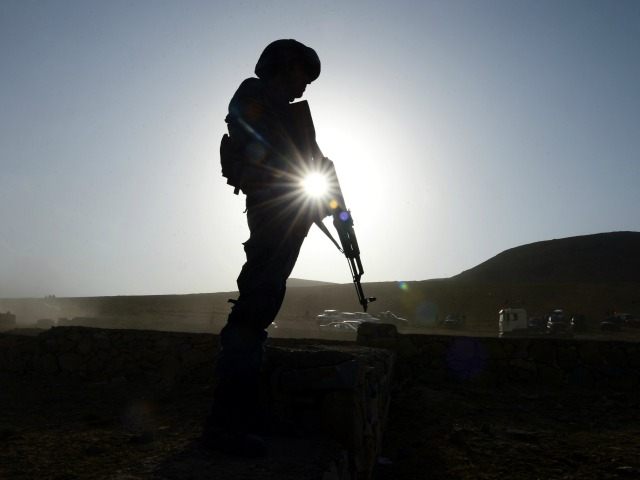WASHINGTON, D.C. — The Khorasan province, a branch of the Islamic State (ISIS/ISIL) in the Afghanistan-Pakistan region, has declared victory over the Taliban in the most recent edition of its propaganda magazine, Dabiq.
ISIS’ declaration comes as U.S. Brig. Gen. Wilson Shoffner, a top spokesman for the U.S.-led NATO coalition in Afghanistan, told Pentagon reporters via video conference from Afghanistan Tuesday that the Taliban only controls or has influence over less than 5 percent of Afghanistan.
Of the 404 districts in Afghanistan, Gen. Shoffner said that the Taliban only controls 9 (about 2 percent) and maintains influence in about 17 others (about 4 percent). He added that the Taliban terrorists were able to make temporary gains in 2015, but they were not able to hold ground or govern.
His comments contradict assessments by The Long War Journal, the United Nations, and most recently Foreign Policy magazine, which claim that the Taliban controls more territory now than at any time since 2001 when it was in control of the Afghan government. According to those assessments, the terrorist group either controls or contests far more than 5 percent of Afghanistan.
“The war between us and the Taliban carries on,” states an article in Dabiq in which the so-called governor of the Khorasan Province, Hafiz Saeed Khan, is interviewed. “The nationalist Taliban movement initiated the combat by attacking the muwahhidīn [monotheists].”
“But the [Khorasan] Wilāyah [province] repelled their aggression and the Taliban then fled many of their strategic areas. Thus victory – by Allah’s grace – was for the Wilāyah,” it continues.
Afghan officials believed Khan was killed by a U.S. airstrike last summer, although their American counterparts doubted claims of his death.
Gen. Shoffner said that the Islamic State, also known as IS, lacks the “the ability to orchestrate or control operations” simultaneously in multiple areas in Afghanistan, outside of its stronghold in eastern Afghanistan’s Nangarhar province, along the border of Pakistan.
“We currently characterize them as operationally emergent… We’re not seeing Daesh elements in Iraq or Syria orchestrating events here in Afghanistan,” he told reporters, using an Arabic term for ISIS.
ISIS also operates in other parts of the country in “small pockets that mainly consists of low-level recruiting and propaganda; we haven’t seen it organized,” he also said, adding that no significant amount of money is coming into Afghanistan to support the jihadist group.
However, a Pentagon report and U.S. Gen. John Campbell, the top commander of American and NATO forces in Afghanistan, recently said that the Khorasan Province (IS-KP) is growing in Afghanistan.
Gen. Campbell added that the jihadist organization wants to establish its Khorasan province base in Jalalabad, the provincial capital of Nangarhar in eastern Afghanistan, adding that there are “indications” that ISIS is trying to consolidate ties with the group’s leadership in Syria and Iraq.
“I’m sure there are folks who have come from Syria and Iraq — I couldn’t tell you how many but there are indications of some foreign fighters coming in there,” he told The Associated Press (AP) last month.
Although Gen. Shoffner conceded that the Khorasan Province (IS-KP) is trying to establish a base in Nangarhar province, located along the border with Pakistan, he noted that the Afghan security forces were successful against the jihadist group over the weekend in Jalalabad.
“They’ve largely been pushed back to the southern parts of Nangarhar province. That area is very, very rugged, it’s very mountainous, it’s on the border with Pakistan, and that’s where most of the Daesh in Nangarhar currently is,” he said.
Khorasan is an ancient name for a region that includes Afghanistan, parts of Pakistan, Iran, India, and other surrounding countries.
In Dabiq, ISIS claims it has “conquered and gained consolidation in five ‘administrative regions'” in the Khorasan region, which it claims “has great importance to Islam and the Muslims.”
ISIS concedes that it has not conquered territory in the Khorasan region on the same level as in Iraq and Syria.
The State Department designated the Khorasan Province, which it described as “ISIL-K,” as a foreign terrorist organization last week, a little over a year after the terrorist group announced the establishment of the branch.
ISIS has been fighting the Taliban group, its proclaimed enemy, for territory in Afghanistan.
Although Gen. Shoffner indicated that the Taliban either controls or maintains influence in less than 5 percent of the country, data compiled by The Long War Journal released last month revealed that the Taliban controls 40 districts and contests another 39. That means that the Taliban either controls or contests about 20 percent of Afghanistan.
Despite the alleged growth of territory held by the Taliban, ISIS is also sprouting in Afghanistan.
A United Nations report released in September 2015 revealed that “the number of groups and individuals who are openly declaring either loyalty to or sympathy with ISIL continues to grow in a number of provinces in Afghanistan.”
The report added that ISIS was operating and recruiting followers in nearly 75 percent (25) of Afghanistan’s 34 provinces.

COMMENTS
Please let us know if you're having issues with commenting.